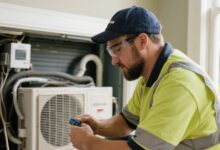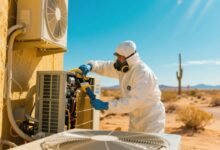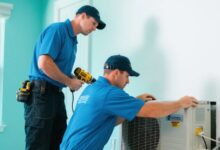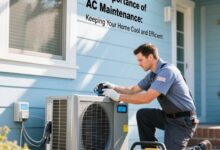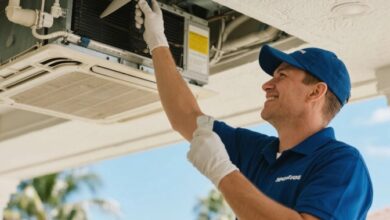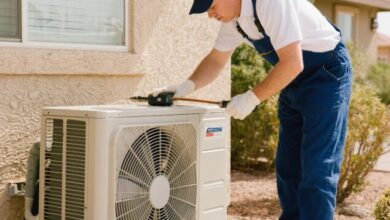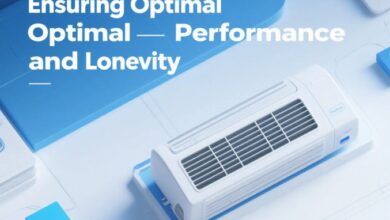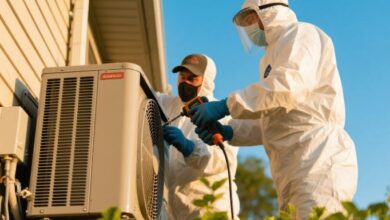An Expert Guide to Commercial AC Maintenance
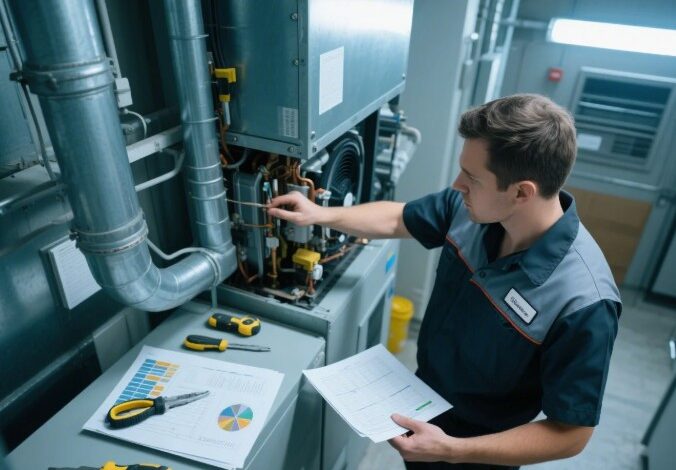
Sponsored Ads
When it comes to running a successful business, maintaining a comfortable and productive working environment is crucial. In many commercial buildings, air conditioning (AC) systems play a vital role in achieving this goal. However, like any other mechanical system, commercial AC units require regular maintenance to ensure optimal performance and longevity.
Why is Commercial AC Maintenance Important?
Commercial AC systems are often more complex and larger in scale than their residential counterparts. This increased complexity and size make regular maintenance even more critical. Here are several reasons why commercial AC maintenance is essential:
1. Energy Efficiency
One of the primary benefits of regular AC maintenance is improved energy efficiency. Over time, dust, dirt, and debris can accumulate in the AC system, leading to decreased airflow and increased energy consumption. By regularly cleaning and maintaining the system, businesses can reduce their energy bills and minimize their environmental impact.
2. Cost Savings
Investing in commercial AC maintenance can save businesses a significant amount of money in the long run. Regular maintenance helps identify and address minor issues before they escalate into major problems that require costly repairs or even system replacement. By addressing these issues early on, businesses can avoid unexpected expenses and prolong the lifespan of their AC system.
3. Improved Indoor Air Quality
Commercial AC systems are responsible for circulating and filtering the air within the building. Without proper maintenance, these systems can become breeding grounds for mold, bacteria, and other contaminants. Regular maintenance, including cleaning and replacing filters, helps ensure that the air circulating in the building is clean and healthy, promoting a comfortable and productive work environment for employees.
4. Enhanced System Performance
Regular maintenance can significantly improve the performance of a commercial AC system. By cleaning and servicing the various components, such as coils, fans, and motors, technicians can optimize the system’s performance and ensure consistent cooling throughout the building. This not only enhances employee comfort but also helps prevent equipment breakdowns during hot summer months.
5. Compliance with Regulations
In many jurisdictions, commercial buildings are subject to regulations regarding AC maintenance. These regulations are put in place to ensure the safety and well-being of building occupants. By adhering to these regulations and conducting regular maintenance, businesses can avoid penalties and legal issues.
Key Components of Commercial AC Maintenance
Now that we understand the importance of commercial AC maintenance, let’s delve into the key components that should be included in a comprehensive maintenance program:
1. Regular Inspections
Regular inspections are the foundation of any commercial AC maintenance program. Trained technicians should conduct thorough inspections of the entire system, including the outdoor and indoor units, ductwork, filters, and electrical connections. These inspections help identify any signs of wear, damage, or potential issues that require attention and correction.
2. Filter Cleaning and Replacement
Filters play a crucial role in maintaining indoor air quality and preventing dust and debris from entering the AC system. Depending on the type of filter, it may need to be cleaned or replaced regularly. Dirty or clogged filters can obstruct airflow and reduce the system’s efficiency.
3. Coil Cleaning
Coils, both evaporator and condenser coils, are prone to accumulating dirt and debris over time. This buildup can hinder heat transfer and decrease the system’s cooling capacity. Regular coil cleaning is necessary to remove dirt and debris, ensuring efficient heat transfer.
4. Condensate Drain Line Cleaning
The condensate drain line carries away the moisture that accumulates as a result of the cooling process. However, over time, this drain line can become clogged with algae, mold, or other debris. Regular cleaning of the condensate drain line prevents clogs and potential water damage to the AC system and building.
5. Lubrication of Moving Parts
Commercial AC systems comprise various moving parts, including motors, belts, and bearings. Proper lubrication of these components is essential to reduce friction and prevent premature wear. Regular lubrication helps extend the system’s lifespan and ensures smooth operation.
6. Electrical System Inspection
Electrical connections and components within the AC system should be inspected regularly to ensure optimal performance. Loose or faulty electrical connections can pose safety hazards and lead to system malfunctions. Technicians should check for any signs of wear, overheating, or damage and address them promptly.
7. Thermostat Calibration
The thermostat is the control center of the AC system, and its accuracy is crucial for maintaining a comfortable indoor temperature. Regular calibration of the thermostat ensures that it accurately reads and controls the temperature, preventing energy waste and temperature inconsistencies.
8. Fan and Motor Inspection
The fans and motors within the AC system should be inspected regularly to ensure they are functioning correctly. Technicians should check for any signs of wear, excessive noise, or overheating. Faulty fans or motors can lead to poor airflow and system breakdowns.
Choosing a Professional AC Maintenance Service Provider
Given the importance of commercial AC maintenance, it is crucial to choose a professional service provider that can meet your business’s needs. Here are some factors to consider when selecting a maintenance service provider:
1. Experience and Expertise
Please be sure to look for a maintenance service provider with extensive experience in servicing commercial AC systems. An experienced provider is more likely to have the knowledge and expertise to address any issues that may arise during the maintenance process.
2. Proper Certification and Licensing
Could you make sure that the maintenance service provider holds the necessary certifications and licenses required by local regulations? These certifications demonstrate that the provider meets industry standards and has the qualifications necessary to perform maintenance on commercial AC systems.
3. Comprehensive Maintenance Plans
Review the maintenance plans offered by different service providers. Look for plans that cover all the key components mentioned earlier and provide a comprehensive approach to AC maintenance. The maintenance plan should be tailored to your business’s specific needs and include regular inspections and servicing.
4. Proven Track Record
Research the service provider’s reputation and track record within the industry. Look for customer reviews and testimonials to gauge their level of customer satisfaction. A service provider with a proven track record is more likely to deliver reliable and high-quality maintenance services.
5. Emergency Response Capability
Please review the service provider’s emergency response capabilities. AC breakdowns can occur at any time, and it is essential to partner with a provider that offers prompt emergency services to minimize downtime and disruption to your business operations.
Conclusion
Commercial AC maintenance is a vital aspect of running a successful business. By investing in regular maintenance, companies can enhance energy efficiency, reduce costs, improve indoor air quality, optimize system performance, and comply with regulations. Key components of commercial AC maintenance include regular inspections, filter cleaning and replacement, coil cleaning, condensate drain line cleaning, lubrication of moving parts, electrical system inspection, thermostat calibration, and inspection of the fan and motor. When choosing a professional AC maintenance service provider, consider their experience, certifications, comprehensive maintenance plans, track record, and emergency response capability. By prioritizing AC maintenance, businesses can ensure a comfortable and productive working environment for their employees while prolonging the lifespan of their AC system.
FAQs After The Conclusion
1. How often should commercial AC systems be maintained?
Commercial AC systems should ideally be maintained twice a year, before the start of the cooling and heating seasons.
2. Can I perform commercial AC maintenance myself?
While some maintenance tasks can be performed by building owners or facility managers, it is recommended to hire a professional service provider for comprehensive AC maintenance.
3. What is the cost of commercial AC maintenance?
The cost of commercial AC maintenance can vary depending on factors such as the system’s size, the number of units, and the level of required servicing. It is best to contact multiple service providers for quotes.
4. What are the signs that my commercial AC system needs maintenance?
Signs that your commercial AC system may need maintenance include reduced cooling or heating capacity, increased energy bills, unusual noises, unpleasant odors, and poor indoor air quality.
5. Can regular maintenance prolong the lifespan of a commercial AC system?
Yes, regular maintenance can significantly extend the lifespan of a commercial AC system by addressing minor issues before they escalate into major problems and by ensuring optimal performance and efficiency.

